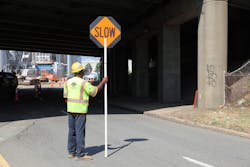Will state transportation referendums impact national policy?
A spate of state ballot initiatives focused on transportation – from repealing the indexing of fuel taxes in Massachusetts to creating “lock boxes” for transportation funds in Wisconsin and Maryland – may or may not affect policy formulation at the national level, according to experts.
One thing they are doing, however, is showcasing that local and state governments now must take the lead in dealing with the transportation issues, noted Patrick Jones, executive director and CEO of the International Bridge, Tunnel and Turnpike Association (IBTTA), in a statement.
“The transportation ballot initiatives in Maryland, Massachusetts, Texas and Wisconsin are strong evidence that states are not waiting for the federal government to act,” he explained.
"Reflecting ongoing concerns over the future of the federal surface transportation reauthorization, state and local governments are embracing homegrown ways to tackle their infrastructure funding challenges,” Jones said.
In Massachusetts, voters eliminated a provision by a margin of 53% to 47% to adjust the state's gasoline and fuel taxes every year based on the annual percentage change in the Consumer Price Index (CPI).
David Paleologos, director of the Suffolk University Political Research Center, told Governing magazine that polls showed Massachusetts residents were “skeptical of automatic increases” and “don’t want any taxes automatically tied to anything.”
Yet in Wisconsin and Maryland, voters agreed to state constitutional amendments that created “lock boxes” for transportation funds, meaning such monies cannot be spent on anything but transportation needs such as road and bridge repairs.
Taken in total, Joseph Kane, a researcher with the Metropolitan Policy Program at the Brookings Institution, told Fleet Owner that such ballot initiatives indicate the general public is becoming far more engaged in transportation issues.
“If anything, it’s a recognition that if something is to be done about transportation, it’s going to be done at the local and state level,” he said. “The public sees the impact of transportation on their lives every day and so the attention this issue is receiving at the ballot box shows their growing awareness of problems.”
The approval in Texas to partially fund state transportation needs with oil and gas revenues – which could add as much as $1.7 billion extra per year to the Texas Department of Transportation’s budget – can be seen as a positive influence on national transportation policy as ways continue to be sought in Congress to restock the highway trust fund (HTF), Kane added.
“Any means that gets support to patch up the HTF will be looked at,” he noted.
Yet James Burnley, who co-chairs the transportation practice at law firm Venable LLP in Washington D.C. and served as U.S. Secretary of Transportation from 1987 to 1989, told Fleet Owner that not too much should be read into the success or failure of such state-level ballot initiatives.
“It’s not likely that the national dynamic will be affected by these various state referendums affecting transportation,” he said. “They don’t have a consistent national theme and are really focused on local needs. I don’t think it too likely that national [policy] inferences will be drawn.”
About the Author
Sean Kilcarr
Editor in Chief
Sean Kilcarr is a former longtime FleetOwner senior editor who wrote for the publication from 2000 to 2018. He served as editor-in-chief from 2017 to 2018.
